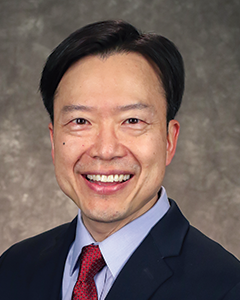Aquablation Relieves BPH's Urinary Symptoms and Preserves Sexual Function
January 4, 2023Categories: Cover Story

North Kansas City Hospital is the only hospital in Missouri and among the first in the United States to offer aquablation therapy to treat benign prostatic hyperplasia. The technique uses imaging, robotics and a heat-free water-jet to provide long-lasting relief with low rates of complications.
“This is the first treatment that allows us to selectively treat the part of the enlarged prostate that blocks urination, but still preserves the part that controls sexual function,” said Gerald Park, MD, a urologist with Kansas City Urology Care.
Aquablation is a sound alternative for men who have not found relief with the first line of treatment — alpha blockers and 5-alpha-reductase inhibitors. While they relax and shrink the prostate, they also may decrease blood pressure and interfere with the prostate’s sexual functions. In addition to resolving symptoms of a hesitant, weak or dribbling urine stream, nocturia and an inability to completely void, aquablation preserves the part of the prostate that controls sexual function.
“As the prostate gets bigger, it begins to cause issues with achieving an erection” said Dr. Park, whose other colleagues at KCUC are also trained to perform aquablations. “Prior to aquablation, patients would undergo medical and surgical treatments that would alleviate the urinary obstructing part of the prostate, but they would severely impact the sexual function of the prostate. With aquablation, we can now treat prostates without diminishing a man’s ability to obtain an erection or to ejaculate.”
The patient is under general anesthesia during the approximately 10-minute, minimally invasive procedure. Dr. Park places a high-resolution ultrasound scope in the patient’s rectum, which provides visualization for precisely mapping areas to resect while avoiding injury to nearby anatomical areas. A robotic arm, which is attached to a cystoscope inserted in the urethra, provides high-velocity sterile saline that follows the outline map to precisely resect the prostate. After an overnight stay in the hospital, the patient returns home on a catheter, which is removed a few days later in Dr. Park’s office.

Gerald Park, MD
Dr. Park earned his medical degree from the University of Texas Medical Branch, and he completed his residency in urology at the University of Kansas